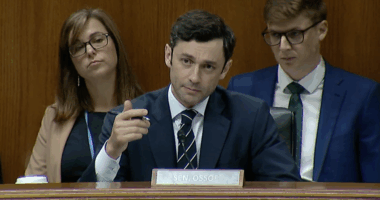Share this @internewscast.com

Republican lawmakers are split over whether President Trump should fire Federal Reserve Chair Jerome Powell, with some pushing him to nix the central bank head and others encouraging him to be patient.
Trump indicated to some lawmakers that he plans to fire Powell during an Oval Office meeting Tuesday evening, a White official and a second source told The Hill. But by Wednesday, the president was walking back some of his sentiments, telling reporters, “I don’t rule out anything, but I think it’s highly unlikely. Unless he has to leave, fraud.”
The idea of Trump pursuing Powell’s removal before his term is up next year rattled the markets, causing them to dip on Wednesday before finishing up. The Dow Jones Industrial Average rose half a percent on the day, and the S&P 500 was up 0.3 percent. It was clear, as Trump has indicated before, his words have a real-time impact on stocks and bonds.
But just who is advising Trump on the matter appears to be somewhat of a mystery.
Sen. Mike Rounds (R-S.D.) was in the camp of believing that firing Powell was a bad idea, citing that markets are watching.
“No. Long term, the markets watch very carefully the independence of the Federal Reserve,” he told The Hill on Wednesday. “I think when the time comes to reduce interest rates and I think the time is coming I think the fact that he has maintained his credibility with the markets will help and will send a really positive message to the markets.”
“By allowing the Fed chair a recognition and a stability in his tenure is going to work to the president’s advantage long term,” Rounds added.
When pressed on whether the president is hearing that message enough, Rounds said he wasn’t sure who has his ear.
“I don’t know who that would be. I think [Treasury Department Secretary Scott Bessent] would clearly understand that, and I’m hoping that his other advisers would be counseling him in the same way,” he said.
Sen. John Hoeven (R-N.D.), meanwhile, said feelings about whether to nix Powell were mixed within the GOP conference.
“It depends who you ask,” he said.
Some Republicans in the House were cheering for Powell to be removed, including Rep. Anna Paulina Luna (R-Fla.), who shared reporting about Trump seeming likely to fire Powell soon and said “told you.”
“Jerome Powell better lower those interest rates. You heard @POTUS’s statement just now. Plenty of smart people with common sense begging for the job. Ball is in his court. If he doesn’t lower rates he will be FIRED. Bookmark this,” she said on the social platform X.
But feelings in that chamber are mixed, too. Rep. Byron Donalds (R-Fla.), who is running for Florida governor, said he’s not on board yet on supporting Powell’s removal.
“I’m not there yet, but I’ll tell you that the president doesn’t rule anything out,” Donalds said in an interview at the Hill Nation Summit.
“It’s pretty clear the president is frustrated about where short-term interest rates are,” Donalds said.
Trump went back and forth about removing Powell this week, reportedly drafting a letter to do so that he showed the lawmakers in the Oval Office meeting Tuesday evening. But by the next day, he called such reporting “not true” and said no letter had been drafted.
Earlier this week, Bessent said there was a “formal process” underway to select Powell’s successor.
Powell’s term as chair of the Federal Reserve Board ends next year, and his term as a member of the board lasts until 2028.
No president has ever fired a Fed chair before, and there are serious doubts about whether presidential powers include the legal authority to do so.
Trump’s main quarrel with Powell is that the Federal Reserve’s interest rate-setting committee hasn’t dropped interest rates this year, a move that would make lending cheaper and likely please financial markets.
Powell said earlier this month that the Fed has held rates steady specifically because of the anticipated price effects of Trump’s tariffs, which have likely just started to show up in the national price data.
Asked if the Fed would have cut rates more if it weren’t for the tariffs, Powell said, “I think that’s right.”
That puts Fed policy squarely at odds with Trump’s desires.
Prices in the consumer price index rose to a 2.7-percent annual increase in June, up from 2.4 percent in May, likely due to the cost of tariffs being passed on to consumers.
Prices rose in heavily imported goods such as apparel, appliances, and home furnishings, which was a smoking gun for tariff inflation for many economists.
Republicans also just passed a law that includes large-scale tax cuts, which are traditionally thought to be economically stimulative, though projections show very little growth coming from the cuts.
“If President Trump’s goal was to get interest rates down, doing nothing would’ve been a much better course of action than imposing sweeping tariffs and passing a huge, deficit-financed tax cut,” Kevin Rinz, a senior fellow at the Washington Center for Equitable Growth, wrote in a commentary.
“Antagonizing the Fed and actively threatening to fire Chairman Powell only makes it harder to get to the point where prices are stable and rates can come down,” he added.
Al Weaver contributed to this report.
















